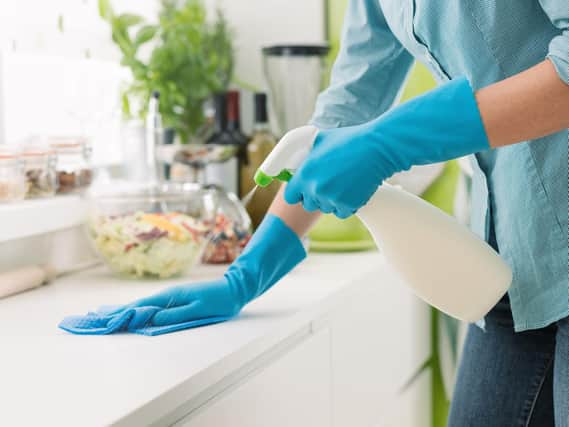Struggling to find Dettol? Household items you can clean your home with and kill coronavirus


Of course, it's been tricky to find some cleaning products in stock in supermarkets due to the demand for household 99.9% antibacterial cleaners.
Last week, cleaning product brand Dettol released a statement saying that although it hasn't tested its cleaners specifically against this new strain of coronavirus (Covid-19), it should kill the virus on surfaces because its products have proved effective against previous strains.
Advertisement
Hide AdAdvertisement
Hide AdBut if you're struggling to find surface cleaners (other brands are available - if they're in stock either), then you can use these common household items to clean. Some of the below even act as natural disinfectants, killing germs on surfaces.
The list has been put together by NetVoucherCodes.co.uk and contains many common products probably lurking in your cupboards:
1. Baking soda
Baking soda is a hardworking cleaning agent that is both versatile and very inexpensive. You can get approximately 200-300g for just a couple of pounds. Baking soda acts as a cleaning agent because it is a mild alkali and can cause dirt and grease to dissolve easily. It’s also great for absorbing strong food odours, and as it’s non-toxic, can be used to clean stains off of fridges, ovens, and microwaves.
2. Distilled white vinegar
Like baking soda, distilled white vinegar is both versatile and inexpensive, and it can be used as a nontoxic disinfecting agent. For rinse-free cleaning, mix around 100ml of white distilled vinegar with two litres of warm water. White vinegar isn't an amazing cleaner compared to proper disinfectants, so use liberally and often, but if it's all you've got it's certainly better than nothing. But if you DO have soap in stock, soap is still more effective (see below...)
3. Hydrogen peroxide
Advertisement
Hide AdAdvertisement
Hide AdHydrogen peroxide has many uses. Combine two parts hydrogen peroxide and one-part dish liquid to create your own laundry spot remover. Apply to clothing with a soft scrub brush to remove wine, chocolate, grass, blood and armpit stains. This same spot remover can also be used to treat carpet and upholstery stains. Because hydrogen peroxide is a mild bleach, it’s best to test the treatment on an inconspicuous area first.
4. Liquid dish soap
Liquid dish soap can be used to do more than the washing up. It works great as a floor cleaner, and to clean worktops and hard surfaces. Dish soap is also one of the best stain removers for oil-based stains on fabrics, and diluted dish soap can be used on dirty glass. Try using diluted dish soap to thoroughly clean glass before going back over the surface with a glass cleaner to shine it up. Hot water and soap, of course, kills coronavirus, but be sure to scrub thoroughly for at least 20 seconds.
5. Salt
Humble table salt is an all-natural, cost-efficient way to keep your home clean. Thanks to its granular texture, it’s a pretty effective cleaner, and can be used to remove wine stains, clean drains, and even brighten up your laundry. Pour a mixture of salt and hot water down the kitchen sink to deodorize and prevent grease build up, or dip a washcloth in a strong saltwater solution, wring it out and briskly rub faded rugs and curtains to brighten the colours.
6. Lemon
Lemons contain both acidity found in the juice, along with the grease-cutting oil contained within its skin to create a superb cleaning sidekick. Its scent is also fresh, clean and energizing, and they are quite inexpensive and easy to come by too. Cut lemons can be used to polish copper and knives that have developed rust spots, as well as to remove stains and smells.
7. Vodka/rubbing alcohol
Advertisement
Hide AdAdvertisement
Hide AdRubbing alcohol is a germicide, so is particularly good for hygiene purposes. From cleaning your blinds to getting our pesky permanent marker stains, it has many uses. Use it to refresh sponges, clean jewellery, and deodorise shoes.
Comment Guidelines
National World encourages reader discussion on our stories. User feedback, insights and back-and-forth exchanges add a rich layer of context to reporting. Please review our Community Guidelines before commenting.